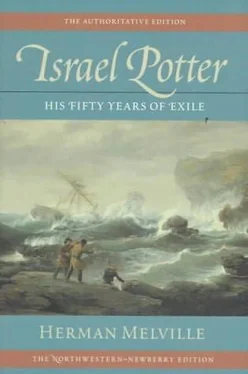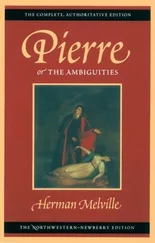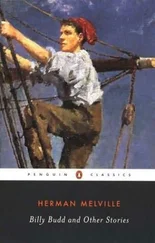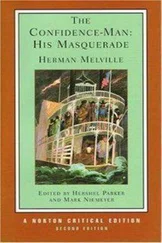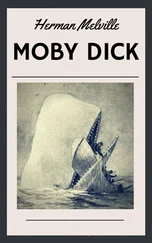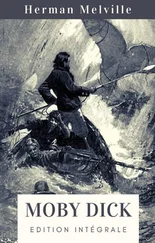Herman Melville - Israel Potter. Fifty Years of Exile
Здесь есть возможность читать онлайн «Herman Melville - Israel Potter. Fifty Years of Exile» весь текст электронной книги совершенно бесплатно (целиком полную версию без сокращений). В некоторых случаях можно слушать аудио, скачать через торрент в формате fb2 и присутствует краткое содержание. Жанр: Классическая проза, на английском языке. Описание произведения, (предисловие) а так же отзывы посетителей доступны на портале библиотеки ЛибКат.
- Название:Israel Potter. Fifty Years of Exile
- Автор:
- Жанр:
- Год:неизвестен
- ISBN:нет данных
- Рейтинг книги:4 / 5. Голосов: 1
-
Избранное:Добавить в избранное
- Отзывы:
-
Ваша оценка:
- 80
- 1
- 2
- 3
- 4
- 5
Israel Potter. Fifty Years of Exile: краткое содержание, описание и аннотация
Предлагаем к чтению аннотацию, описание, краткое содержание или предисловие (зависит от того, что написал сам автор книги «Israel Potter. Fifty Years of Exile»). Если вы не нашли необходимую информацию о книге — напишите в комментариях, мы постараемся отыскать её.
Israel Potter. Fifty Years of Exile — читать онлайн бесплатно полную книгу (весь текст) целиком
Ниже представлен текст книги, разбитый по страницам. Система сохранения места последней прочитанной страницы, позволяет с удобством читать онлайн бесплатно книгу «Israel Potter. Fifty Years of Exile», без необходимости каждый раз заново искать на чём Вы остановились. Поставьте закладку, и сможете в любой момент перейти на страницу, на которой закончили чтение.
Интервал:
Закладка:
"I am John Woodcock," said the host, "and these gentlemen are Horne Tooke and James Bridges. All three of us are friends to America. We have heard of you for some weeks past, and inferring from your conduct, that you must be a Yankee of the true blue stamp, we have resolved to employ you in a way which you cannot but gladly approve; for surely, though an exile, you are still willing to serve your country; if not as a sailor or soldier, yet as a traveller?"
"Tell me how I may do it?" demanded Israel, not completely at ease.
"At that in good time," smiled the Squire. "The point is now-do you repose confidence in my statements?"
Israel glanced inquiringly upon the Squire; then upon his companions; and meeting the expressive, enthusiastic, candid countenance of Horne Tooke-then in the first honest ardor of his political career-turned to the Squire, and said, "Sir, I believe what you have said. Tell me now what I am to do."
"Oh, there is just nothing to be done to-night," said the Squire; "nor for some days to come perhaps, but we wanted to have you prepared."
And hereupon he hinted to his guest rather vaguely of his general intention; and that over, begged him to entertain them with some account of his adventures since he first took up arms for his country. To this Israel had no objections in the world, since all men love to tell the tale of hardships endured in a righteous cause. But ere beginning his story, the Squire refreshed him with some cold beef, laid in a snowy napkin, and a glass of Perry, and thrice during the narration of the adventures, pressed him with additional draughts.
But after his second glass, Israel declined to drink more, mild as the beverage was. For he noticed, that not only did the three gentlemen listen with the utmost interest to his story, but likewise interrupted him with questions and cross-questions in the most pertinacious manner. So this led him to be on his guard, not being absolutely certain yet, as to who they might really be, or what was their real design. But as it turned out, Squire Woodcock and his friends only sought to satisfy themselves thoroughly, before making their final disclosures, that the exile was one in whom implicit confidence might be placed.
And to this desirable conclusion they eventually came, for upon the ending of Israel's story, after expressing their sympathies for his hardships, and applauding his generous patriotism in so patiently enduring adversity, as well as singing the praises of his gallant fellow-soldiers of Bunker Hill, they openly revealed their scheme. They wished to know whether Israel would undertake a trip to Paris, to carry an important message-shortly to be received for transmission through them-to Doctor Franklin, then in that capital.
"All your expenses shall be paid, not to speak of a compensation besides," said the Squire; "will you go?"
"I must think of it," said Israel, not yet wholly confirmed in his mind.
But once more he cast his glance on Horne Tooke, and his irresolution was gone.
The Squire now informed Israel that, to avoid suspicions, it would be necessary for him to remove to another place until the hour at which he should start for Paris. They enjoined upon him the profoundest secresy, gave him a guinea, with a letter for a gentleman in White Waltham, a town some miles from Brentford, which point they begged him to reach as soon as possible, there to tarry for further instructions.
Having informed him of thus much, Squire Woodcock asked him to hold out his right foot.
"What for?" said Israel.
"Why, would you not like to have a pair of new boots against your return?" smiled Home Tooke.
"Oh, yes; no objection at all," said, Israel.
"Well, then, let the bootmaker measure you," smiled Horne Tooke.
"Do you do it, Mr. Tooke," said the Squire; "you measure men's parts better than I."
"Hold out your foot, my good friend," said Horne Tooke-"there-now let's measure your heart."
"For that, measure me round the chest," said Israel.
"Just the man we want," said Mr. Bridges, triumphantly.
"Give him another glass of wine, Squire," said Horne Tooke.
Exchanging the farmer's clothes for still another disguise, Israel now set out immediately, on foot, for his destination, having received minute directions as to his road, and arriving in White Waltham on the following morning was very cordially received by the gentleman to whom he carried the letter. This person, another of the active English friends of America, possessed a particular knowledge of late events in that land. To him Israel was indebted for much entertaining information.
After remaining some ten days at this place, word came from Squire Woodcock, requiring Israel's immediate return, stating the hour at which he must arrive at the house, namely, two o'clock on the following morning. So, after another night's solitary trudge across the country, the wanderer was welcomed by the same three gentlemen as before, seated in the same room.
"The time has now come," said Squire Woodcock. "You must start this morning for Paris. Take off your shoes."
"Am I to steal from here to Paris on my stocking-feet?" said Israel, whose late easy good living at White Waltham had not failed to bring out the good-natured and mirthful part of him, even as his prior experiences had produced, for the most part, something like a contrary result.
"Oh, no," smiled Horne Tooke, who always lived well, "we have seven-league-boots for you. Don't you remember my measuring you?"
Hereupon going to the closet, the Squire brought out a pair of new boots. They were fitted with false heels. Unscrewing these, the Squire showed Israel the papers concealed beneath. They were of a fine tissuey fibre, and contained much writing in a very small compass. The boots, it need hardly be said, had been particularly made for the occasion.
"Walk across the room with them," said the Squire, when Israel had pulled them on.
"He'll surely be discovered," smiled Horne Tooke. "Hark how he creaks."
"Come, come, it's too serious a matter for joking," said the Squire.
"Now, my fine fellow, be cautious, be sober, be vigilant, and above all things be speedy."
Being furnished now with all requisite directions, and a supply of money, Israel, taking leave of Mr. Tooke and Mr. Bridges, was secretly conducted down stairs by the Squire, and in five minutes' time was on his way to Charing Cross in London, where taking the post-coach for Dover, he thence went in a packet to Calais, and in fifteen minutes after landing, was being wheeled over French soil towards Paris. He arrived there in safety, and freely declaring himself an American, the peculiarly friendly relations of the two nations at that period, procured him kindly attentions even from strangers.
CHAPTER VII
AFTER A CURIOUS ADVENTURE UPON THE PONT NEUF, ISRAEL ENTERS THE PRESENCE
OF THE RENOWNED SAGE, DR. FRANKLIN, WHOM HE FINDS RIGHT LEARNEDLY AND
MULTIFARIOUSLY EMPLOYED
Following the directions given him at the place where the diligence stopped, Israel was crossing the Pont Neuf, to find Doctor Franklin, when he was suddenly called to by a man standing on one side of the bridge, just under the equestrian statue of Henry IV.
The man had a small, shabby-looking box before him on the ground, with a box of blacking on one side of it, and several shoe-brushes upon the other. Holding another brush in his hand, he politely seconded his verbal invitation by gracefully flourishing the brush in the air.
"What do you want of me, neighbor?" said Israel, pausing in somewhat uneasy astonishment.
"Ah, Monsieur," exclaimed the man, and with voluble politeness he ran on with a long string of French, which of course was all Greek to poor Israel. But what his language failed to convey, his gestures now made very plain. Pointing to the wet muddy state of the bridge, splashed by a recent rain, and then to the feet of the wayfarer, and lastly to the brush in his hand, he appeared to be deeply regretting that a gentleman of Israel's otherwise imposing appearance should be seen abroad with unpolished boots, offering at the same time to remove their blemishes.
Читать дальшеИнтервал:
Закладка:
Похожие книги на «Israel Potter. Fifty Years of Exile»
Представляем Вашему вниманию похожие книги на «Israel Potter. Fifty Years of Exile» списком для выбора. Мы отобрали схожую по названию и смыслу литературу в надежде предоставить читателям больше вариантов отыскать новые, интересные, ещё непрочитанные произведения.
Обсуждение, отзывы о книге «Israel Potter. Fifty Years of Exile» и просто собственные мнения читателей. Оставьте ваши комментарии, напишите, что Вы думаете о произведении, его смысле или главных героях. Укажите что конкретно понравилось, а что нет, и почему Вы так считаете.
